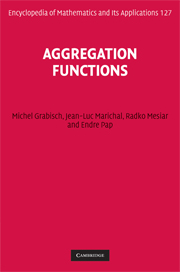Book contents
- Frontmatter
- Contents
- List of figures
- List of tables
- Preface
- 1 Introduction
- 2 Properties for aggregation
- 3 Conjunctive and disjunctive aggregation functions
- 4 Means and averages
- 5 Aggregation functions based on nonadditive integrals
- 6 Construction methods
- 7 Aggregation on specific scale types
- 8 Aggregation on ordinal scales
- 9 Aggregation on bipolar scales
- 10 Behavioral analysis of aggregation functions
- 11 Identification of aggregation functions
- Appendix A Aggregation of infinitely many arguments
- Appendix B Examples and applications
- List of symbols
- References
- Index
7 - Aggregation on specific scale types
Published online by Cambridge University Press: 05 March 2013
- Frontmatter
- Contents
- List of figures
- List of tables
- Preface
- 1 Introduction
- 2 Properties for aggregation
- 3 Conjunctive and disjunctive aggregation functions
- 4 Means and averages
- 5 Aggregation functions based on nonadditive integrals
- 6 Construction methods
- 7 Aggregation on specific scale types
- 8 Aggregation on ordinal scales
- 9 Aggregation on bipolar scales
- 10 Behavioral analysis of aggregation functions
- 11 Identification of aggregation functions
- Appendix A Aggregation of infinitely many arguments
- Appendix B Examples and applications
- List of symbols
- References
- Index
Summary
Introduction
This chapter is devoted to the study of meaningful n-ary functions mapping specific scales into a scale in the sense of measurement theory, all the scales considered being of the same type. In many practical problems, individual measurements are merged into one dependent variable and further exploited for decision purposes, demanding the exclusion of the influence of the applied scales (both in independent and dependent variables). The scale types are defined through admissible transformations, whose consideration may significantly reduce the number of acceptable aggregation functions. For a detailed introduction we recommend Section 2.4 of this book. The relevant literature can be found in [6, 12, 13, 238, 256, 257, 364, 365].
Though it is possible to combine scales of different types, too (see for instance Aczél and Roberts [12] and Aczél et al. [13]), we focus in this chapter on the case when the independent and dependent variables define scales of the same type. Namely, we discuss ratio scales, difference scales, interval scales, and log-ratio scales. The case of ordinal scales will be discussed in Chapter 8. Note that the majority of results in the literature deal with admissible transformations which are (increasing) bijections on, and thus the choice of is restricted, too. For example, for ratio scales supposing rx ∈ for each r > 0 and x ∈ means that a nondegenerate interval is either ∣0, ∞[,or] − ∈, 0∣, or ℝ.
- Type
- Chapter
- Information
- Aggregation Functions , pp. 272 - 291Publisher: Cambridge University PressPrint publication year: 2009



